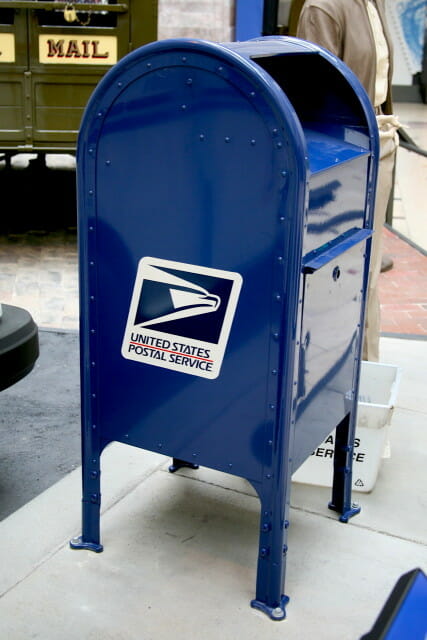 We’ve previously written about how First Amendment free speech rights intersect with advertising for marijuana. We’ve also written about how a Colorado television station pulled the plug on a marijuana television commercial over concerns about violating federal broadcast regulations. We have also apprised everyone of how multiple social media platforms are #SorryNotSorry for shutting down pages and posts about marijuana. Now the U.S. Postal Service is jumping onto the anti-marijuana bandwagon, telling mail centers and couriers (and, indirectly, newspapers and advertisers) that distributing marijuana ads through the U.S. mail is a violation of federal law.
We’ve previously written about how First Amendment free speech rights intersect with advertising for marijuana. We’ve also written about how a Colorado television station pulled the plug on a marijuana television commercial over concerns about violating federal broadcast regulations. We have also apprised everyone of how multiple social media platforms are #SorryNotSorry for shutting down pages and posts about marijuana. Now the U.S. Postal Service is jumping onto the anti-marijuana bandwagon, telling mail centers and couriers (and, indirectly, newspapers and advertisers) that distributing marijuana ads through the U.S. mail is a violation of federal law.
In a written notice dated November 27, 2015, issued by the Portland, Oregon, District Mailing Requirements Office, the U.S. Postal Service dutifully explains that “[i]f a mailpiece contains an advertisement for marijuana, that mailpiece is nonmailable”:
If an advertisement solicits the mailing of controlled substances such as marijuana, it would violate USPS mailing standards. Marijuana is classified as a Schedule I controlled substance. . . U.S.C. 21 843(c) does make it unlawful to place an ad in any publication with the purpose of seeking or offering illegally to receive, buy, or distribute a Schedule I controlled substance. . . If an advertisement advocates the purchase of clinical marijuana through a Medical Marijuana Dispensary, it does not comply with U.S.C. 21 843(c).
Leaving the criminal issues aside, advertising material, which is considered commercial speech, is protected by the First Amendment but it does not receive the same amount of protection as other forms of speech, such as political speech. In Central Hudson Gas & Electric Corp. v. Public Service Commission of New York, the US Supreme Court set out a four-part test to determine whether government regulation of advertising speech is valid: (1) Does the advertisement involve lawful activity? (2) Does the government have a substantial interest? (3) Does the regulation of the advertisement advance the substantial government interest? (4) Is the regulation the least restrictive means of advancing the substantial government interest?
Cannabis ads that promote federally unlawful activity pretty clearly fall under prong one of Central Hudson, giving the Feds the power to severely limit or completely eliminate marijuana commercial speech. In fact, in the past, the Feds have threatened to go after anyone who advertises for marijuana, including broadcasters and publishers, but it never made good on the threat.
The Postal Service notice doesn’t necessarily go after newspapers regarding their ability to allow marijuana businesses to advertise with them — this is not within the Postal Service’s enforcement authority. Instead, the notice focuses entirely on how newspapers cannot legally use the U.S. mail to distribute marijuana-related ads since marijuana is still a Schedule I controlled substance.
Still, this notice is just plain weird, and it shows how out of touch the federal government is when it comes to state-legal marijuana. It also shows the disconnect between various federal agencies when it comes to cannabis.
The issuance of the notice is tardy to say the least. Marijuana businesses have been advertising in newspapers and magazines — and using the mail to do so — for years. Second, it appears that the notice went out from just the one Oregon office and it is not at all clear that other U.S. Postal Service offices in other states with robust marijuana economies have similar concerns. Third, there’s no threat of enforcement in the notice; it just seems to be a public service announcement. Fourth, this notice came from the Portland District Mailing Requirements Office, a local agency, and not directly from U.S. Postal Services headquarters. And, lastly, and most obviously (though not surprisingly), this directive from the U.S. postal services goes against the current federal policies set forth in the August 2013 Cole Memo.
In a written response to the notice, U.S. Senator Ron Wyden, U.S. Senator Jeff Merkley and U.S. Representatives Suzanne Bonamici and Earl Blumenauer to Postmaster General and Postal Service CEO Megan J. Brennan, seek clarity on how federal postal regulations intersect with state laws that legalize recreational marijuana, with their number one question being “[w]hat discretion does a regional postmaster have in enforcing or implementing these policies, specifically in states where marijuana is legal?” We are wondering the same thing and we will report back to you as soon as an answer is forthcoming.
In the meantime, we can add the U.S. Postal Service to the list of federal agencies with no clue about cannabis.























